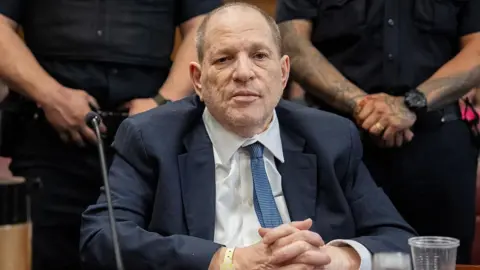Jurors in Harvey Weinstein trial reportedly fighting among themselves
 Getty Images
Getty ImagesThe New York jury deciding whether to convict disgraced film mogul Harvey Weinstein of sex crimes appears divided, with some jurors reportedly launching verbal attacks against each other and also considering information not brought up in the recent retrial.
Five male and seven female jurors have deliberated for three days over whether to find Weinstein guilty of rape and criminal sex acts. His 2020 conviction was thrown out last year.
Monday morning in court began with a note from the foreperson that read: "I need to talk to you about a situation which isn't very good."
Weinstein's lawyers then filed for a mistrial, which the judge denied, and details emerged about the unfolding drama.
After discussions with attorneys on Monday, Judge Curtis Farber later called the jury's foreperson back to the court's robing room to discuss the issue.
The foreperson told him that, even though juries are only supposed to consider evidence and testimony presented during the trial, some jurors were trying to convince others of their point of view by bringing up parts of Weinstein's public history, according to a court transcript.
"They are pushing people, talking about his past," the foreperson said.
Jurors were "not on the same page" and some were "attacking" others, trying to change their minds, the foreperson added, according to the transcript.
Judge Farber said he would give jurors a new instruction telling them that their deliberations relate only "to the three crimes".
"That is the only thing that it can be used for in their deliberations, only the evidence introduced at this trial," he told the attorneys, according to the transcript.
Weinstein was convicted of sex crimes in New York in 2020. The case was overturned last year when an appeals court found the 73-year-old did not receive a fair trial because a judge allowed testimony from women who made allegations against him beyond the charges at hand. Prosecutors then filed sexual assault charges again in September.
The appeals ruling hung over the retrial, making the court extremely cautious about allowing allegations against Weinstein from outside the realm of the case.
The drama comes after one juror told the judge last week that others had been speaking badly outside the courthouse about a fellow juror, and that they had "shunned" the person.
"It's playground stuff," he said.
The young man asked to be dismissed because he did not think deliberations were "fair and just", but the judge kept him on the jury.
The jury also sent a note Monday morning asking Judge Farber to reread the concept of reasonable doubt and rules of deliberation "especially in terms of avoiding a hung jury".
Typically in New York, if a jury in a criminal trial is not able to reach a unanimous verdict - as is required to convict or acquit the defendant - the judge may give them an Allen charge, an instruction to go back to deliberations to try once again to reach a verdict.
Eventually, a hung jury can result in a mistrial.
The jurors left at the end of Monday without a verdict, but sent a note saying they were "making progress", and requesting to revisit some evidence and be given "coffee for the morning for energy".
The trial centred on three women - a former television production assistant, an aspiring actress, and a model - who accused Weinstein of using his power in Hollywood to sexually abuse them.
In total, Weinstein has been accused of sexual misconduct, assault and rape by more than 100 women. While not all reports resulted in criminal charges, a separate sex crimes conviction for Weinstein in California means he is likely to spend the rest of his life in prison.
The decision by his accusers to come forward, and his subsequent conviction in New York, galvanised the #MeToo movement against sex abuse by powerful men.
